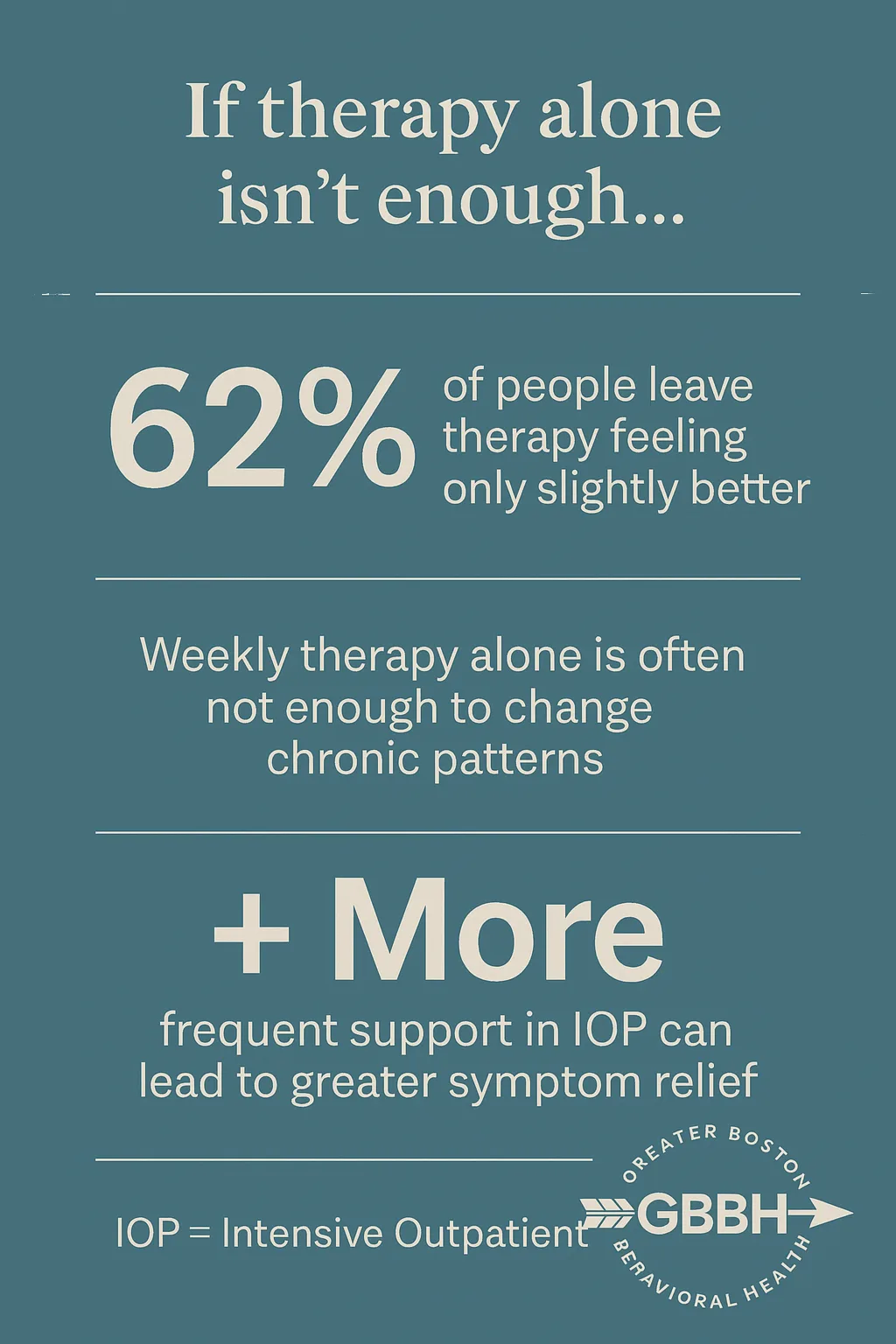You know the script. You walk into your therapist’s office, settle into the chair, talk through your week… and leave wondering if you actually got anywhere. You’ve been responsible. You’ve followed through. Maybe you’ve tried multiple therapists, different modalities, or medication adjustments—and still, that internal stuckness lingers.
That’s not failure. That’s a sign you need a stronger system, not more of the same. And for many high-functioning adults, that’s exactly what an intensive outpatient program (IOP) delivers.
At Greater Boston Behavioral Health, IOP isn’t just “more therapy.” It’s a structured, immersive experience designed to meet you at your real-life breaking points—before they turn into crisis.
Therapy Can Stabilize You—IOP Can Transform You
Let’s be honest: traditional therapy can help you maintain functioning. It can help you understand yourself, gain insights, maybe make small shifts. But sometimes, maintenance just isn’t enough.
IOP is built for change, not just management. It gives you a consistent, intensive structure—multiple sessions per week, multiple types of therapy, and a whole team invested in your progress.
It’s the difference between trying to fix a leak with duct tape versus having a full repair crew assess and rebuild your foundation.
Why “High-Functioning” Can Be a Trap
Being high-functioning doesn’t mean you’re thriving. It means you’re good at hiding the cracks. You show up to work, manage your responsibilities, but inside, you’re running on fumes. Maybe therapy helped you keep things just manageable enough that no one realized how much you were struggling.
IOP calls out the silent suffering and finally gives it enough attention, frequency, and accountability to move the needle.
If you’re based in Massachusetts and feel like you’ve been faking your way through “fine,” consider exploring an intensive outpatient program in Boston, MA. You don’t have to wait for your life to implode before you ask for deeper support.
More Frequency, More Impact
One therapy session a week leaves too much room for backsliding. You have six other days of stress, pressure, and mental strain without support.
In IOP, you meet with your care team three to five times a week, giving you momentum. There’s no long gap where your inner critic, anxiety, or depression can undo your progress.
Here’s what that structure looks like at Greater Boston Behavioral Health:
- Group therapy with peers who understand what “high-functioning but not okay” feels like
- Individual counseling with licensed therapists focused on your specific struggles
- Skills sessions focused on practical tools—stress regulation, boundaries, emotional processing
- Supportive check-ins so you’re never left wondering what’s next
This isn’t passive talk therapy. This is movement—fast enough to feel it, structured enough to sustain it.
IOP Makes Mental Health Care Practical
A huge blocker for many high-functioning adults is the logistical nightmare of care. Time off work? Weeks away from family? That’s not happening.
IOP meets you where you are—at home, at your job, in your life. Most programs are flexible, offering daytime and evening schedules. You get high-quality, high-frequency care without burning your life down to access it.
If you’ve been hesitant because you can’t step away from work or parenting, know that IOP doesn’t require you to choose between your life and your mental health. It’s built for integration, not isolation.
A Bigger Toolbox, Not Just Bigger Talk
One of the most common frustrations I hear from people who’ve done therapy for years is this: “I understand my patterns, but I don’t know how to change them.”
That’s where IOP excels. It’s not just insight—it’s skill acquisition. You’ll:
- Practice distress tolerance in real-time, not just discuss it.
- Rewire thought patterns through targeted, repetitive exercises.
- Get feedback from multiple perspectives—group, individual, and clinical—so you can break blind spots.
- Learn skills and rehearse them with support, then apply them in your daily routine and process the results the next day.
It’s like finally upgrading from a basic toolkit to a professional set—with guidance on how to use every tool inside.
You Haven’t Failed—The System Failed You
If therapy hasn’t helped you make the progress you crave, it’s not because you’re “difficult” or “resistant.” It’s because weekly therapy wasn’t built for transformation—it was built for maintenance.
IOP is built to change your baseline. To offer real movement. To help you reconnect to joy, clarity, and resilience—not just survival mode.
At Greater Boston Behavioral Health, we specialize in high-functioning adults who feel mentally drained but outwardly “fine.” We know the signs, and we know the way out.
FAQs About Intensive Outpatient Programs
What exactly is an intensive outpatient program (IOP)?
An intensive outpatient program is a structured mental health treatment model that provides therapy multiple times per week while allowing you to live at home. You participate in a mix of group therapy, individual counseling, and skills training—typically 9-15 hours weekly.
How is IOP different from regular therapy?
The biggest difference is frequency and structure. Instead of a once-a-week session, you engage in multiple sessions per week, often with several types of therapy involved. This consistency helps you build momentum, address issues in real-time, and make faster, more sustainable progress.
Is IOP only for people in crisis?
Not at all. Many IOP clients are high-functioning adults—holding jobs, managing families—who are silently struggling. IOP helps prevent escalation by offering intensive care before things spiral.
Can I keep working while attending IOP?
Yes. Many programs, including Greater Boston Behavioral Health’s IOP, offer daytime and evening options so you can receive care without quitting your job.
How do I know if IOP is right for me?
If you’ve done traditional therapy and still feel stuck, overwhelmed, or flatlined—IOP might be the next step. It’s designed for people who need more structure but can’t pause their life. Contact Greater Boston Behavioral Health for a free consultation to discuss your options.
You don’t need to hit rock bottom to get help. Call (888) 450-3097 or visit to learn more about intensive outpatient program services in Boston, Massachusetts—and get unstuck for good. If you’re near Boston, Dedham, Waltham, Needham, or West Roxbury, Massachusetts, GBBH offers programs with that same approach.


